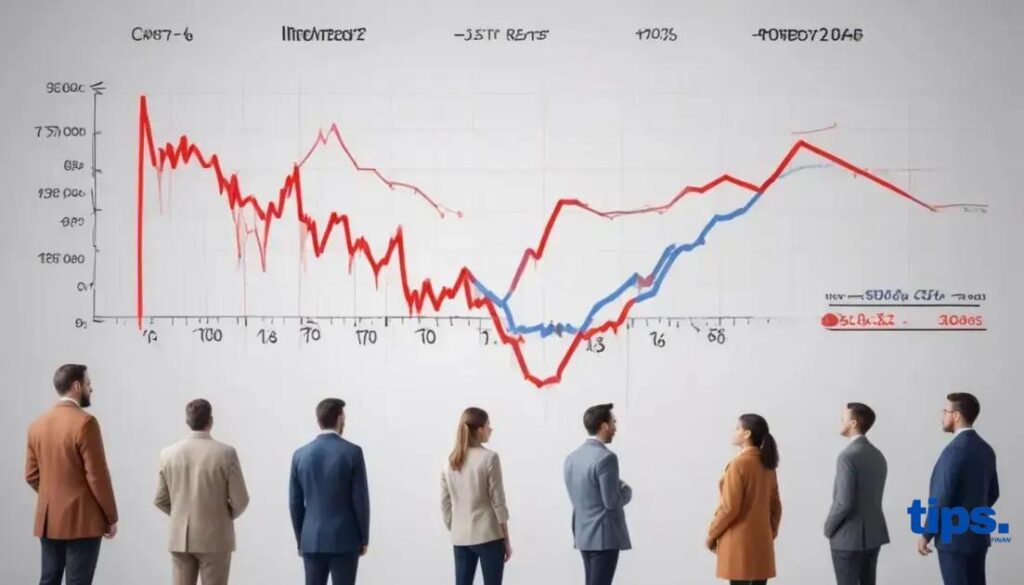Inflation concerns 2025: what to expect and prepare for

Anúncios
Inflation concerns for 2025 require individuals to adopt strategies like investing in assets, increasing savings, and reducing debt to effectively manage the impact on their finances.
Inflation concerns 2025 are surfacing, prompting many to ask how it will affect their financial well-being. As economic forecasts change, it’s essential to understand the potential impacts and prepare accordingly.
Anúncios
Understanding inflation trends
Understanding inflation trends is crucial for managing your finances effectively. Inflation indicates how much prices rise over time, affecting everything from groceries to housing costs.
The current economic climate shows varying inflation rates, making it essential to keep an eye on these trends. Higher inflation can erode purchasing power, requiring consumers to spend more for the same items.
Factors Influencing Inflation
Several factors contribute to inflation trends, including:
Anúncios
- Supply and demand dynamics in the market.
- Global events, such as pandemics or wars, that disrupt trade.
- Government monetary policies that affect money supply.
For more detailed insights, you can refer to resources from the U.S. Bureau of Labor Statistics. They provide updated statistics and analysis on inflation trends.
By staying informed about these factors, individuals and businesses can make better financial decisions and prepare for future economic changes.
Historical context of inflation
The historical context of inflation provides valuable insights into current economic conditions. Over the years, countries have faced various inflationary pressures that shaped their economies.
Many factors contribute to inflation, including wars, oil crises, and government policies. Understanding these factors can help individuals grasp how inflation affects their daily lives.
Key Historical Events
Several notable events have impacted inflation rates:
- The Great Depression of the 1930s led to significant deflation in many economies.
- The oil crisis in the 1970s caused skyrocketing prices globally.
- The COVID-19 pandemic in 2020 disrupted supply chains and created inflation concerns.
To explore more about inflation’s history, you can access information from the Federal Reserve Bank of San Francisco. They provide detailed analysis and resources on economic phenomena.
| Topic | Key Insight | Impact |
|---|---|---|
| Inflation Trends | Prices rising unevenly | Reduces purchasing power |
| Historical Context | Past crises inform today | Helps forecast and prepare |
| 2025 Projections | Rates may remain unstable | Affects budgeting and planning |
| Consumer Spending | Spending habits adjust | More focus on essentials |
| Savings & Investments | Real returns may shrink | Encourages asset investing |
| Government Response | Interest rate hikes, fiscal tools | Helps manage inflation curve |
| Personal Strategies | Invest, save, reduce debt | Protects long-term wealth |
| Global Outlook | Varied inflation across regions | Affects trade and policies |
Projected inflation rates for 2025
Projected inflation rates for 2025 are a critical concern for consumers and businesses alike. Understanding these projections can help individuals plan their finances better.
Experts forecast that inflation may fluctuate due to several factors, including economic recovery and government policies.
Key Influencers of Inflation Rates
Several key factors are likely to influence inflation rates in 2025:
- The growth of the economy post-pandemic, impacting demand.
- Changes in consumer spending habits as people return to normal activities.
- Government monetary policies aimed at controlling inflation.
For more reliable projections, you can check reports from the Congressional Budget Office. They provide valuable economic forecasts and analyses regarding inflation.
By staying informed, you can make better financial decisions and be prepared for future economic conditions.
Impact of inflation on consumer spending

The impact of inflation on consumer spending is significant. When prices rise, consumers must adjust their spending habits to cope with the higher costs of goods and services.
Inflation reduces the purchasing power of money, meaning that consumers can buy less with the same amount of money than before. This can lead to changes in what people prioritize when spending.
How Inflation Affects Spending
Several ways inflation influences consumer spending include:
- Shifting to cheaper alternatives or products.
- Reducing discretionary spending, such as dining out or entertainment.
- Increased demand for credit to cover higher costs.
To learn more about how inflation impacts consumer behavior, visit the Consumer Financial Protection Bureau. They provide insights into financial trends and consumer spending.
As inflation continues to rise, understanding these effects helps individuals prepare for necessary adjustments in their budgets and spending habits.
How inflation affects savings and investments
How inflation affects savings and investments is a critical consideration for everyone. Rising inflation can erode the value of money over time, impacting both savings and investment returns.
When inflation rates increase, the purchasing power of saved money decreases. This means that what you can buy with your savings will diminish if those savings do not grow at the same rate as inflation.
Impact on Savings
Inflation influences savings in various ways:
- Higher inflation rates can lead to lower real interest rates on savings accounts.
- If savings do not earn enough interest to outpace inflation, consumers lose money in real terms.
- People may prioritize investing over saving in high-inflation scenarios to seek better returns.
To understand more about how inflation impacts personal finance, check the resources available at the U.S. Securities and Exchange Commission. They offer valuable advice on savings and investments.
Being aware of inflation’s effects can help individuals make informed choices about how to allocate their money effectively.
Government policies to address inflation
Government policies to address inflation play a vital role in managing economic stability. When inflation rises, governments take action to mitigate its effects on consumers and the economy.
These policies can vary significantly, depending on the economic context and the specific goals of the government.
Common Government Approaches
Some common policies used to address inflation include:
- Adjusting interest rates: Central banks may raise rates to cool down an overheated economy.
- Implementing fiscal policies: Governments can increase taxes or reduce spending to limit growth.
- Controlling money supply: Reducing the amount of money available in the economy can help to lower inflation.
To learn more about how governments manage inflation, visit the Federal Reserve. They offer a range of resources on monetary policy and inflation management.
Understanding these policies helps individuals anticipate how inflation may affect their finances.
Strategies for individuals to combat inflation
Strategies for individuals to combat inflation are crucial in today’s economy. As prices rise, planning becomes essential to maintain financial stability.
Many people can take proactive steps to minimize the impact of inflation on their finances and savings.
Effective Strategies
Here are some useful strategies to consider:
- Invest in assets: Consider investing in stocks or real estate that have historically outpaced inflation.
- Increase savings: Build an emergency fund to address unexpected expenses that inflation might cause.
- Reduce debt: Paying off high-interest debt can free up more money for savings and investments.
For additional financial tips, visit the Consumer Financial Protection Bureau. They provide valuable insights into managing personal finances and building smart spending habits.
By adopting these strategies, individuals can better protect their financial futures against inflation’s effects.
Global perspectives on inflation concerns

Global perspectives on inflation concerns highlight how different countries experience and address inflation. While inflation is a common economic phenomenon, its effects can vary widely across regions.
In some economies, inflation can lead to significant challenges, while in others, it might be managed effectively through various policies.
Inflation Trends Worldwide
Key factors influencing global inflation perspectives include:
- Monetary policy decisions by central banks around the world.
- The impact of supply chain disruptions, such as those seen during the pandemic.
- Geopolitical events that can influence oil prices and other commodities.
To gain deeper insights into global inflation trends, check resources from the International Monetary Fund. They analyze economic conditions and provide valuable reports on inflation worldwide.
Understanding how different regions address inflation helps individuals and businesses prepare for potential economic shifts.
Understanding and Addressing Inflation
Inflation affects everyone, from individuals to businesses. It’s essential to recognize how it impacts savings, investments, and consumer spending.
By understanding the strategies to combat inflation and staying informed about government policies, individuals can better manage their finances.
Additionally, looking at global perspectives gives us valuable insights into how different countries handle inflation concerns. This knowledge is key to preparing for the future.
Staying proactive and educated about inflation will help everyone navigate these economic challenges more effectively.





